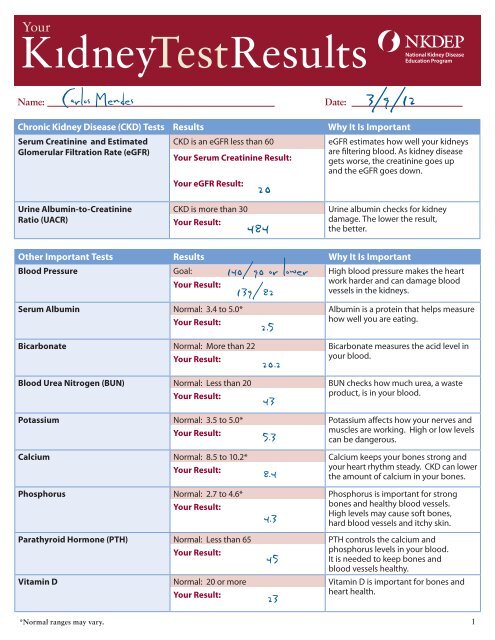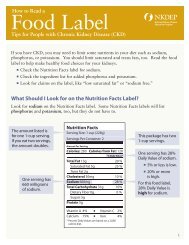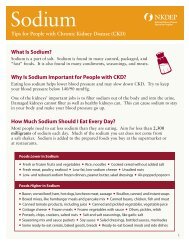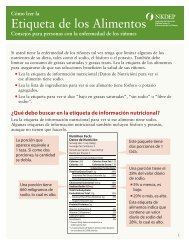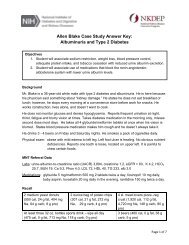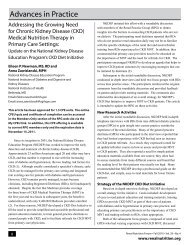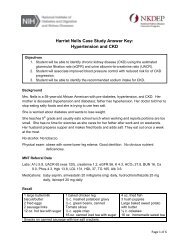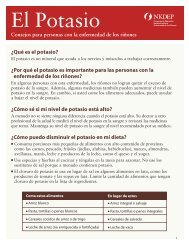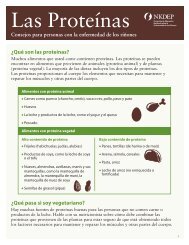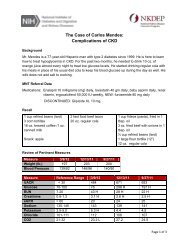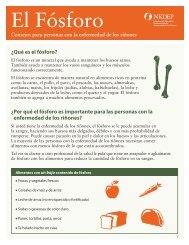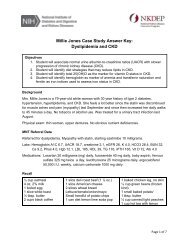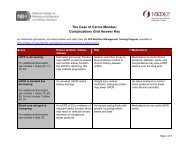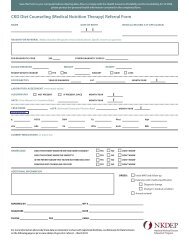Carlos Mendes Case Study: Your Kidney Test Results Answer Key
Carlos Mendes Case Study: Your Kidney Test Results Answer Key
Carlos Mendes Case Study: Your Kidney Test Results Answer Key
Create successful ePaper yourself
Turn your PDF publications into a flip-book with our unique Google optimized e-Paper software.
Name: <strong>Carlos</strong> <strong>Mendes</strong> Date: 3/9/12<br />
Chronic <strong>Kidney</strong> Disease (CKD) <strong>Test</strong>s <strong>Results</strong> Why It Is Important<br />
National <strong>Kidney</strong> Disease<br />
Education Program<br />
Serum Creatinine and Estimated CKD is an eGFR less than 60 eGFR estimates how well your kidneys<br />
Glomerular Filtration Rate (eGFR)<br />
are filtering blood. As kidney disease<br />
<strong>Your</strong> Serum Creatinine Result: gets worse, the creatinine goes up<br />
20<br />
and the eGFR goes down.<br />
<strong>Your</strong> eGFR Result:<br />
Urine Albumin-to-Creatinine CKD is more than 30<br />
484<br />
Urine albumin checks for kidney<br />
Ratio (UACR)<br />
<strong>Your</strong> Result: damage. The lower the result,<br />
the better.<br />
Other Important <strong>Test</strong>s <strong>Results</strong> Why It Is Important<br />
Blood Pressure Goal: 140/90 or lower High blood pressure makes the heart<br />
<strong>Your</strong> Result:<br />
work harder and can damage blood<br />
139/82<br />
vessels in the kidneys.<br />
Serum Albumin Normal: 3.4 to 5.0* Albumin is a protein that helps measure<br />
<strong>Your</strong> Result: how well you are eating.<br />
2.5<br />
Bicarbonate Normal: More than 22 Bicarbonate measures the acid level in<br />
<strong>Your</strong> Result: your blood.<br />
20.2<br />
Blood Urea Nitrogen (BUN) Normal: Less than 20 BUN checks how much urea, a waste<br />
<strong>Your</strong> Result: product, is in your blood.<br />
43<br />
Potassium<br />
Normal: 3.5 to 5.0*<br />
<strong>Your</strong> Result:<br />
5.3<br />
<strong>Your</strong> Result:<br />
8.4<br />
Potassium affects how your nerves and<br />
muscles are working. High or low levels<br />
can be dangerous.<br />
Calcium Normal: 8.5 to 10.2* Calcium keeps your bones strong and<br />
your heart rhythm steady. CKD can lower<br />
the amount of calcium in your bones.<br />
Phosphorus Normal: 2.7 to 4.6* Phosphorus is important for strong<br />
<strong>Your</strong> Result:<br />
bones and healthy blood vessels.<br />
High levels may cause soft bones,<br />
4.3<br />
hard blood vessels and itchy skin.<br />
Parathyroid Hormone (PTH) Normal: Less than 65 PTH controls the calcium and<br />
<strong>Your</strong> Result: phosphorus levels in your blood.<br />
45 It is needed to keep bones and<br />
blood vessels healthy.<br />
Vitamin D Normal: 20 or more Vitamin D is important for bones and<br />
<strong>Your</strong> Result: heart health.<br />
23<br />
*Normal ranges may vary.<br />
1
<strong>Your</strong> <strong>Kidney</strong> <strong>Test</strong> <strong>Results</strong><br />
Other Important <strong>Test</strong>s, continued <strong>Results</strong> Why It Is Important<br />
A1C (for patients with diabetes) Goal: up to 7.0 A1C estimates average blood sugar<br />
<strong>Your</strong> Result: levels over 2 to 3 months.<br />
6.6<br />
Total Cholesterol Normal: Less than 200 Cholesterol measures the amount of fat<br />
<strong>Your</strong> Result: in your blood. Too much cholesterol<br />
184<br />
can clog blood vessels or arteries in the<br />
heart and kidneys.<br />
HDL Cholesterol Normal: More than 40 HDL is the good cholesterol and clears<br />
<strong>Your</strong> Result: bad fats out of your arteries.<br />
38<br />
LDL Cholesterol Normal: Less than 100 LDL is the bad cholesterol and can clog<br />
<strong>Your</strong> Result: your arteries.<br />
104<br />
Triglycerides<br />
(Sept 2011)<br />
Normal: Less than 150<br />
<strong>Your</strong> Result:<br />
136<br />
Triglyceride is a type of fat in<br />
the blood.<br />
Hemoglobin (Hgb) Normal: 12 to 17* Low hemoglobin is a sign of anemia.<br />
<strong>Your</strong> Result: You may feel tired if you have anemia.<br />
12.4<br />
*Normal ranges may vary.<br />
Notes:<br />
For more information, visit www.nkdep.nih.gov or call 1-866-4 KIDNEY (1-866-454-3639).<br />
The National <strong>Kidney</strong> Disease Education Program (NKDEP)<br />
encourages people to get tested for kidney disease and<br />
educates those with kidney disease and their providers<br />
about treatments that can help delay or prevent kidney<br />
failure. NKDEP is a program of the National Institutes<br />
of Health.<br />
NIH Publication No. 13-7407 • Revised February 2013<br />
NIH...Turning Discovery Into Health®<br />
2


